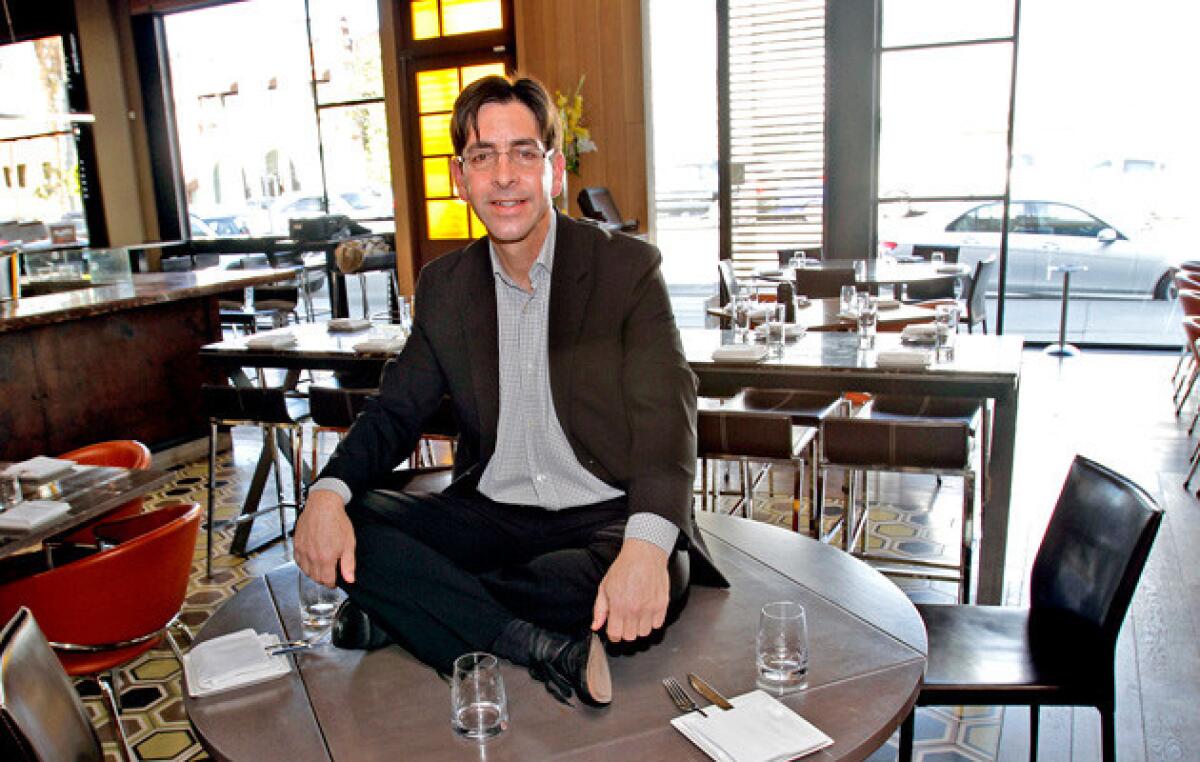Bill Chait navigates rocky shoals of L.A. restaurant business

- Share via
Bill Chait is leading a half-dozen colleagues through a two-story factory that has been converted into lofts on the edge of downtown’s Arts District. The building is the future home of his next project, a $1.2-million, 140-seat trattoria called Bestia, in the shadow of the 7th Street bridge, next to train tracks that run along the L.A. River. Among its neighbors are a furniture warehouse, a diesel gas station and an all-nude strip club.
“It’s the SoHo of L.A.,” says Chait, a soft-spoken but steely 51-year-old with dark, side-parted hair, slightly big ears and metal-framed glasses. He waves his notepad: “This is going to be all patio. Over here, a sophisticated drink rail. We’re getting an Acunto [pizza] oven” from Naples.
Where others might see a gamble on a stretch of urban hinterland, he already envisions the restaurant.
Though Chait is the biggest mover and shaker in Southern California’s restaurant business, most diners have never heard of him. While most restaurateurs would be happy to open one well-reviewed, commercially successful fine-dining restaurant, and two would be considered nothing short of miraculous, Chait has opened six. And that’s just in the last three years.
He’s the guy behind Short Order and Short Cake with Nancy Silverton, Picca with Ricardo Zarate, Rivera and Playa with John Sedlar, and Sotto with Steve Samson and Zach Pollack.
And he shows no sign of slowing down. In the fall, he plans to relaunch Test Kitchen, last year’s pop-up sensation that hosted more than 50 chefs in three months, then open Bestia. He and Sprout, the restaurant group he formed with philanthropist Aileen Getty and L.A. Specialty Produce founder Mike Glick, are also in talks to partner in a restaurant in downtown’s Vibiana with chef Neal Fraser.
Chait is not a celebrity chef, hip designer or night life impresario. Instead, he’s something that might be even more vital in the restaurant world these days: a keen businessman. He has the entrepreneurial battle scars of a restaurant-chain founder who lived through a crash-and-burn after go-go growth plans in the ‘90s.
Now, propelled by a “new L.A. food scene,” he seems to have a winning formula for what he calls “premiere boutique neighborhood restaurants” — good locations, the right chef partners, unique concepts and design, and a business model that revolves around not-too-big-not-too-small restaurants that cater to consumers’ expanding palates and shrinking wallets.
“Somebody asked, ‘Oh, is he L.A.’s version of a Danny Meyer?’” says Silverton, referring to the successful chief executive of New York’s Union Square Hospitality Group, which has restaurants as varied as the Modern, Shake Shack and the Michelin three-starred Eleven Madison Park. “Maybe he is…. He certainly has all the beginnings of a Danny Meyer. Everybody involved hopes that’s the case.”
So far so good? More than 800 customers showed up on Short Order’s opening day last month at the original Farmers Market on West 3rd Street, and 2,300 came out on the first weekend. “Sales are 125% of what we expected,” Chait says.
According to Chait, 3-year-old Rivera, which features Sedlar’s refined Latin cuisine and which received a rare 3½-star review from Times restaurant critic S. Irene Virbila, is “really successful,” though he wouldn’t provide sales or profit figures.
It hasn’t always been multi-star reviews and tasting menus. Chait got his feet wet in the restaurant business just after he graduated from UC Berkeley, delivering pizzas alongside actor Tim Robbins at Jacopo’s Pizzeria in Beverly Hills. “I liked the restaurant business, the mechanics of it, the way it worked,” he says.
Chait says he inherited his drive from his mother, “the true entrepreneur of the family.” She earned her law degree at 50, started her own practice and saved enough money to fulfill her dream of buying real estate in Beverly Hills. (Chait’s parents divorced when he was 5, and he describes his father, an engineer, as a “decent guy who didn’t take any gambles.”)
Starting young
At 25, he asked a broker to show him a restaurant, something he could get his arms around, he says, and he bought Louise’s Italian Kitchen on 26th Street in Brentwood (back when there really was a Louise), partly funded by a loan backed with one of his mother’s buildings. The next year he bought a second location on Montana Avenue and spawned the Louise’s Trattoria chain.
By 1996 there were 15 Louise’s, and Entrepreneur magazine put him and then-partner Howard Weinberg on its list of young millionaires, with sales projections that year at nearly $30 million. It was a red-sauce empire built on pizza-and-pasta Italian favorites. But the following year, Louise’s filed for Chapter 11 bankruptcy protection, citing too-rapid expansion and rampant expenses.
“The concept of being in business is that you learn much more from your failures than your successes,” Chait says. “People have said that, but I’ve lived it. If you’re really good at being an entrepreneur, you’re not necessarily good at being a business operator of the entrepreneurial thing that you’ve created.”
Chait says the turning point in his career as a restaurateur was Rivera. After struggling to turn around Spark Woodfire Grill in Simi Valley, part of another chain in which Chait is a partner, he thought he was taking a hiatus. “I thought I would get [Rivera] going, it would be a fun thing to do. But it took on a life of its own,” he says.
Since then, Chait has managed to capture the zeitgeist of the Los Angeles food scene with each opening.
So what makes him the success that he is so far? Certainly finding the right locations, the right talents and the right concepts are keys, but taking care of the nuts and bolts of the business is just as big a part of the equation.
Chait doesn’t work out of an office but regularly schedules meetings at his restaurants: burger bun tastings, negotiations over dishwashing systems or staff training sessions. On a recent afternoon he’s sitting at a table at Louise’s in Los Feliz. He’s still a director and minority shareholder of LT Acquisition Corp., the corporate parent of Louise’s.
He and Chief Executive Robert Serritella and architect Osvaldo Maiozzi, who has worked on all of Chait’s recent restaurants, are poring over blueprints. They’re discussing the renovation of Louise’s Los Feliz: where to put a fire pit, what type of kitchen equipment is necessary, how much tiles will cost.
But the big picture is to transform the Louise’s in Los Feliz into Mess Hall, what Chait describes as “higher energy, simpler food, with a modern twist.”
“It’s a tough market; it’s not all-boats-rise-with-the-tide anymore,” Chait says. “You have to be unique. The Hollywood sequel mentality doesn’t work in the restaurant business.”
The drive to be unique is similarly what inspired Picca and Sotto, both located in the building that formerly housed another Spark Woodfire Grill on Pico Boulevard. “That space was a failure,” says Chait, who doesn’t shy from radical do-overs.
So it closed in the summer of 2010, and he decided to install two restaurants in the multilevel townhouse. In the interim, he co-created Test Kitchen, the series of pop-up dinners that hosted a new chef every few days. It lasted three months while Picca was built out upstairs.
Among the guest chefs at Test Kitchen were Samson and Pollack, who would partner with Chait to open Sotto. “I think he saw the future of restaurants in L.A. being more chef-driven,” Samson says. Now “friends are calling us and saying, ‘We would love to meet with Bill.’”
Still on the lookout
Meanwhile, Chait is scouting more locations downtown. One Friday morning, real estate investor Larry Silverton (Nancy’s father) and his associate ride up on their motorcycles to the future site of Bestia to meet Chait. Each carrying a manila folder with lists of properties for sale, they climb into a real estate broker’s BMW 535i to cruise the Arts District.
“I remember when brokers drove around in Suburbans,” says Chait jokingly, squeezed into the back seat.
The three spend the rest of the morning and the early part of the afternoon looking at warehouses, office buildings, a property on which sits a carwash for semis.
But the right partner and right location are only the beginning. Then it’s his job to “craft a business plan around creativity,” he says. Sitting at one of Short Order’s wooden tables, Chait draws a bell curve on a piece of paper, with dollars invested and annual revenue as its axes. He draws a line through the part of the curve where $1 million invested corresponds to $3 million in projected revenue.
They’re not $5-million restaurants, but they’re not “recyclers” — that is, putting, say, a couple hundred thousand dollars into a space that already was a restaurant.
“The tricky part of the inception of a restaurant are legal matters that are hypercritical,” Chait says. “The budgeting, the planning, the permitting. If you do all these things right, only then do you get the luxury of finding out whether the restaurant works.
“But, there’s an unknown component to everything in the business world. What it really takes is the ability to adapt to the unknown. Nobody knows exactly how to do this. You have to be nimble.”
More to Read
Eat your way across L.A.
Get our weekly Tasting Notes newsletter for reviews, news and more.
You may occasionally receive promotional content from the Los Angeles Times.











